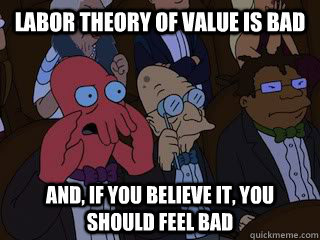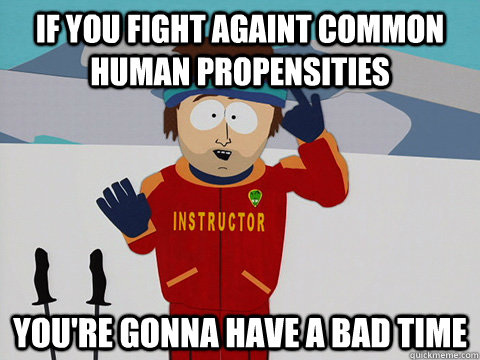What a Tangled Web We Weave when We First Choose to I.P.
Disclaimer: I'm (slowly) writing a book (which will be public domain). My wife is an aspiring actual author.
If libertarians can get past the size of government issue, and the land issue, and the abortion issue, there remain few areas of to argue with one another about... except intellectual property. Most libertarians come down against intellectual property. I haven't investigated the positions held by non-libertarians, so I can't speak from experience there. I'm not a libertarian because I think self-ownership is a crap axiom and that the non-aggression principle has problems, but I used to be one.
I spent some time on the fence on various aspects of intellectual property but eventually have come to be against it for one simple and ultimately selfish reason: enforcing it diminishes the goal actualization of those in society who are useful to me and thus my goal actualization.
I spent some time on the fence on various aspects of intellectual property but eventually have come to be against it for one simple and ultimately selfish reason: enforcing it diminishes the goal actualization of those in society who are useful to me and thus my goal actualization.
Yet Another Rights Refresher
If you haven't read the page outlining my view on rights, it may be helpful to do so.
I view property rights - indeed all rights, as tools for people to get what they want and avoid what they don't want around other humans. I don't view them as something divine or which are immutable or optimal in all situations. I see them as intersubjective respect constructs. They don't (directly) come from nature or reason, but neither do they come from government or some nebulous "society." They are peer-to-peer - they come from one another.
While they can be justified through logic, that logic must ultimately serve goals and desires. You don't have rights so much as others respect you enough to not interfere with your actions or to actively benefit you in some manner. In a single-element system, rights make no sense; one merely has abilities.
The only reason people respect others is because they want to more than they don't want to. Other than an innate disposition toward respecting another, the two reasons why someone might refrain from or undertake action for the sake of another is because they find the other useful to them (either emotionally or in some calculated instrumental manner) or they believe that the other is capable of making states of affairs they want to avoid occur or states of affairs they want to maintain cease. Basically love and fear.
Rights have costs to continually supply because respect has costs to continually supply. Generally the less goals another enables or can thwart, the less respect they'll get. The more one has to sacrifice in costs to refrain from or undertake action, and the more the alternative states of affairs are desired, the less respect one will give to another. Nothing groundbreaking here.
I want to start off by slaying two terrible arguments which are used often enough to be worth mentioning. Then I can move on to standard justifications and eventually get to why I'm against IP.
I view property rights - indeed all rights, as tools for people to get what they want and avoid what they don't want around other humans. I don't view them as something divine or which are immutable or optimal in all situations. I see them as intersubjective respect constructs. They don't (directly) come from nature or reason, but neither do they come from government or some nebulous "society." They are peer-to-peer - they come from one another.
While they can be justified through logic, that logic must ultimately serve goals and desires. You don't have rights so much as others respect you enough to not interfere with your actions or to actively benefit you in some manner. In a single-element system, rights make no sense; one merely has abilities.
The only reason people respect others is because they want to more than they don't want to. Other than an innate disposition toward respecting another, the two reasons why someone might refrain from or undertake action for the sake of another is because they find the other useful to them (either emotionally or in some calculated instrumental manner) or they believe that the other is capable of making states of affairs they want to avoid occur or states of affairs they want to maintain cease. Basically love and fear.
Rights have costs to continually supply because respect has costs to continually supply. Generally the less goals another enables or can thwart, the less respect they'll get. The more one has to sacrifice in costs to refrain from or undertake action, and the more the alternative states of affairs are desired, the less respect one will give to another. Nothing groundbreaking here.
I want to start off by slaying two terrible arguments which are used often enough to be worth mentioning. Then I can move on to standard justifications and eventually get to why I'm against IP.
Worst Anti-IP Argument - It interferes with the use of legitimate property
This argument is begging the question. One can't claim that some property is illegitimate because it interferes with legitimate property when legitimacy is what one is attempting to show. You have to explain what makes a form of property legitimate without reference to legitimacy.
If we're being honest, property is whatever people decide it is. I don't consider some forms of ownership claims to be valid; for instance ownership of humans or claims of ownership of nature which aren't bounded by equal rights of others. Others have different views on what property claims are legitimate.
Secondly, all property claims interfere with the use of other property. If your house ownership is legitimate, then I am prohibited from using my legitimately owned car to drive into your house.
If we're being honest, property is whatever people decide it is. I don't consider some forms of ownership claims to be valid; for instance ownership of humans or claims of ownership of nature which aren't bounded by equal rights of others. Others have different views on what property claims are legitimate.
Secondly, all property claims interfere with the use of other property. If your house ownership is legitimate, then I am prohibited from using my legitimately owned car to drive into your house.
Worst Pro-IP Argument - I worked hard on it / my time is scarce
|
The terrible Pro-IP argument is that IP is legitimate because people spend real, scarce, effort and time on creating and discovering things and for others to make use of the fruits of their labor without consent is theft.
Unfortunately this view is either the labor theory of value or a first cousin of it. Why should I or anyone else care about how much work went into something if the end result isn't something we value? I can spend all day working on a difficult-to-create ice sculpture, does that mean I can demand more for my efforts than someone who only works one hour at a really easy job? No it doesn't. Maybe I can, maybe I can't but others have a hand in setting the price I can charge. Normally, a seller can withhold something to bind the price on the supply side. That doesn't work with non-rivalrous goods. Steve Buscemi captures my sentiments in this area... |
|
No one is forcing anyone to go into a specific line of work and there are many which don't pay well or where one won't get to keep reaping certain continual benefits of their efforts. If I go around painting murals on buildings, I can lose those murals if the buildings' recognized owners decide to paint over my work or tear the building down. If I spend hours making a snowman, spring can ruin my work. If I try to set up a business in a third-world, war-torn country, it might get taken over or burned out.
It's up each individual to own their desires and weigh the likely consequences of their decisions. It doesn't mean they have to like that those consequences exist or that they can't work to change them, but they can't bitch about something happening that the average child knew was likely going in. |
Update: someone pointed out that it's not the labor theory of value, but the labor theory of property - that property is justified by expending effort. While that'd be better than a labor theory of value, I still reject it. Property is typically justified relative to labor because people need to be induced to produce at least for themselves and their families to survive. When humans deny others the fruits of their labor, then those others are less likely to produce. Societies need truth, trust, and trade to work. My life is made better by society. Bam! Reasons. Property, and all norms, are grounded on consequences. If certain forms of things which labor are applied to don't benefit others or actively or passively harm others, then those others may reject a labor justification for that type of property... and their not wrong.
But, Justin, didn't the previous justify I.P.? Nope... for reasons dealt with later in this post.
But, Justin, didn't the previous justify I.P.? Nope... for reasons dealt with later in this post.
The Standard Justification
The standard justification for intellectual property varies somewhat depending on the type of intellectual property in question. For trademarks, it's to prevent marketplace confusion. For copyrights and patents, it's to benefit society (however you take that to mean - I'd say the goal actualization of members in that society), others would say "progress."
People can always produce knock-offs more cheaply than original creators and researchers, all else being equal. The original creator/researcher has to expend effort in creating or discovering. Subsequent parties don't have those costs. Given the prima facie reasonable assumptions that:
then there's a problem and intervention may be justified. The current solution addresses #1 - I.P. is an attempt to prevent people from undercutting.
Of course, #3 is necessary to justify such an intervention from the public good angle; if copyright or patents were permanent then the benefit obtained by others from creations or discoveries would be much lower - possibly low enough to destroy the justification for intellectual property entirely. I've only heard one person ever argue for indefinite intellectual property on the grounds of property itself - not the standard, society-benefitting, justification. Anyone I've ever heard arguing the standard justification believes in a limited-duration monopoly.
#2 is also necessary to justify an intervention; if people will create regardless of control or reward, then interference is not justified even if #1 and #3 remain true.
People can always produce knock-offs more cheaply than original creators and researchers, all else being equal. The original creator/researcher has to expend effort in creating or discovering. Subsequent parties don't have those costs. Given the prima facie reasonable assumptions that:
- People will undercut and
- People won't create/discover if they know they're likely to get undercut and
- Others in society have a vested interest in creations and discoveries.
then there's a problem and intervention may be justified. The current solution addresses #1 - I.P. is an attempt to prevent people from undercutting.
Of course, #3 is necessary to justify such an intervention from the public good angle; if copyright or patents were permanent then the benefit obtained by others from creations or discoveries would be much lower - possibly low enough to destroy the justification for intellectual property entirely. I've only heard one person ever argue for indefinite intellectual property on the grounds of property itself - not the standard, society-benefitting, justification. Anyone I've ever heard arguing the standard justification believes in a limited-duration monopoly.
#2 is also necessary to justify an intervention; if people will create regardless of control or reward, then interference is not justified even if #1 and #3 remain true.
The Standard Rejections
|
There are a few standard rejections. The favorite of Reddit libertarians seems to be that IP is not scarce. As trite as that sounds, it's actually not a bad rejection. Scarce may or may not be rivalrous. Non-scarce is definitely not rivalrous. While the effort which goes into something is certainly scarce, ideas, once created are not scarce and hence non-rivalrous. Further, without a lot of enforcement work, they are non-excludable. Unless you are going to start denying some of the well-established tenets of economics, you're going to have to admit they are better classed as either public or club goods.
|
| ||||||||||||
We All Stand on the Shoulders of Giants
|
That hero story you wrote? You ripped off previous monomyths. Often without paying it forward like some kind of grade-a jerk. The song you wrote? Yeah, Pachelbel did it centuries ago. Discoveries are nearly always "only" the next logical step in a path blazed by people before you. I'm not trying to diminish the work one puts in but I see a real lack of humility.
For those who want IP to last forever, are you kicking money back to Newton's estate for using calculus? If you're using the benefits gained argument, are you paying your neighbor when he paints his house a color you like since you gain the non-excludable, non-rivalrous benefit of looking at it? |
"Where's my money, bitch?"
- Isaac Newton, Newton v. Leibniz patent trial. |
For the Good of Society?
Ok, now back to the "sane" argument for IP - societies which encourage invention and art are awesome compared to those which don't and even with some short-term restrictions (i.e. pre Sonny Bono) people in those societies generally come out ahead. Well, I have one big problem up front - I'm not a progressive. By that I mean I don't believe in some sort of meta-progress - yes, people get closer to certain goals and further away from others, but those goals don't have to be set in stone. People will tend to judge progress through the lens of their current paradigm.
The Actualization Ethic says do for "good society" because it will do for you, not out of some spooky dualist "obligation." Nothing says you need to stick with The Actualization Ethic until the day you die. If everyone decided tomorrow to party like it was 1999 and then ritual suicide themselves the day after that, there'd be nothing wrong with that from some "view from nowhere." It'd make humans just another evolutionary dead end but, as a species, "we're all dead in the long run." The long-view matters if you care about the long-view and, for many things, people don't. It's not up to you to decide for them.
But, let's go with the "good of society" overriding what people want now. Tell me, Danny Discovery, how do you plan to pay for the costs of enforcement to try to cram that public good into the club good category?
The Actualization Ethic says do for "good society" because it will do for you, not out of some spooky dualist "obligation." Nothing says you need to stick with The Actualization Ethic until the day you die. If everyone decided tomorrow to party like it was 1999 and then ritual suicide themselves the day after that, there'd be nothing wrong with that from some "view from nowhere." It'd make humans just another evolutionary dead end but, as a species, "we're all dead in the long run." The long-view matters if you care about the long-view and, for many things, people don't. It's not up to you to decide for them.
But, let's go with the "good of society" overriding what people want now. Tell me, Danny Discovery, how do you plan to pay for the costs of enforcement to try to cram that public good into the club good category?
Costs of Enforcement
The costs of enforcement relate not only to money, but also to what is forgone now and what will be foregone in the future due to a decision; a good acronym for cost is Closed Opportunity Selection Tree. I want to focus on four specific areas which raise IP enforcement costs significantly above tangible property (TP) enforcement costs.
Most if not all of us have reasons to be against thieves and liars, but we also have reasons to be against people who let themselves be prey and increase costs for everyone else. If you park a nice car in the ghetto and leave it unlocked with no Lojack or The Club in it then, if it gets stolen, you're an idiot who is either costing others more via the police or insurance premiums.
While it's unreasonable to blame the victim and demand that everyone drives around in an APC and wears chainmail, it's also unreasonable to let slide activity which promotes one being a victim.
Most if not all of us have reasons to be against thieves and liars, but we also have reasons to be against people who let themselves be prey and increase costs for everyone else. If you park a nice car in the ghetto and leave it unlocked with no Lojack or The Club in it then, if it gets stolen, you're an idiot who is either costing others more via the police or insurance premiums.
While it's unreasonable to blame the victim and demand that everyone drives around in an APC and wears chainmail, it's also unreasonable to let slide activity which promotes one being a victim.
Cost 1: Fighting human propensities
|
If rights are respect, then rights are more likely to exist for things which humans already have a propensity toward respecting. Most humans don't want to take personal property. I have certain ideas on the reasons but they are irrelevant for this point. For the few people who don't respect private property, you can stand armed guard and get them to respect it, or you can lock your property away and deny opportunity.
Fewer people respect claiming something which you didn't make or don't appear to be actively using. This observation informs my assertion that large landholdings could only be defended by something which approximates a state in form if not in name unless some significant socioeconomic changes were implemented. |
Into this second category, I'd lump ideas. From oral traditions to cave paintings to dance to telling jokes to improving on methods of doing things by observation and modification, humans are nature's remixers. If it's not in our DNA, it's damn near hardwired. Telling people not to take something which is obviously rivalrous and which someone obviously spent time making and which one has experience with possessing (so that they have empathy for the loser) is an easy sell. Telling people to not improve their lives by making use of the discovery of others or to not retell and remix stories goes against a key piece of what made humans who and what we are today. It's fighting strongly ingrained propensities.
Cost 2: Direct Discovery and Enforcement
Since one can't let ideas out for a while and then put them in the garage later and can't depend on people to respect a demand to not make use of or remix ideas, there's no practical way to control who has access to it short of not releasing it or only releasing it to trusted people or have a powerful group of individuals force others to respect such property claims through threat of punishment.
The costs foisted onto the courts and, increasingly onto private ISPs and importers are attempts to monitor violations and they fall on people not involved in IP violations precisely because it's too hard to crack down on violators any other way.
The costs foisted onto the courts and, increasingly onto private ISPs and importers are attempts to monitor violations and they fall on people not involved in IP violations precisely because it's too hard to crack down on violators any other way.
Cost 3: The Potential for Censorship and Government Abuse
This is where the costs start getting foisted onto the public at large. The argument could be made that the copyright or patent holder has to bring suit and thus the court costs are minimal. It could be unconvincingly argued that the costs to ISPs aren't that big of a deal since not everyone has internet service at their house.
Letting government and big business become involved in monitoring communications, and trade, and business IS a big deal. Perhaps I'm over skeptical of the corrupting influence of power, but I suspect the tide of history is on my side. Once you let the camel get his nose into the tent, how long will the free exchange of ideas continue? One of my operating rules is "don't cede power to others that you care about being able to take back."
Letting government and big business become involved in monitoring communications, and trade, and business IS a big deal. Perhaps I'm over skeptical of the corrupting influence of power, but I suspect the tide of history is on my side. Once you let the camel get his nose into the tent, how long will the free exchange of ideas continue? One of my operating rules is "don't cede power to others that you care about being able to take back."
Cost 4: Truth and Trade and Society
IP imposes costs on those who are using society as a tool. Anything which interferes with truth, trust, or trade tends to water down the glue which binds people together into a coherent social organism. Society doesn't matter for its own sake, but most people are using society to get what they want and, for those people, society matters.
Censorship interferes with the expression of truth. That's not my opinion, that's a tautology. It also interferes with the dissemination/sharing/trading of information. One can draw lines of convenience and make the claim that the perfect is the enemy of the good but, for me, those lines are drawn very close to the ideal. If you want a recent example of that, click here.
Censorship interferes with the expression of truth. That's not my opinion, that's a tautology. It also interferes with the dissemination/sharing/trading of information. One can draw lines of convenience and make the claim that the perfect is the enemy of the good but, for me, those lines are drawn very close to the ideal. If you want a recent example of that, click here.
Summary: Revisiting the Standard Justification
The reason I am against IP is simply because the cost of enforcing it harms or has the potential to harm people more than the benefit it provides and that the benefits can be had in other ways.
But what if people are better able to actualize their goals if there are inventions and art which wouldn't be there if the people exposing or creating them weren't incentivized even with the attendant risks of censorship and social dissolution? Well, then, according to a goal actualization metric, creators should be incentivized.
Like many things, the choice isn't boolean - there's an excluded middle of being able to benefit individuals by getting creators to create by incentivizing them without necessitating an Idea Stasi.
If you fight economics, you're going to lose. The four categories I listed earlier aren't just a neat way to lump things in a 2x2 table - they allow prescriptions once a goal is defined; they're grouped that way because that grouping is useful.
Intellectual property is a public good. With sufficient statism, they could be club goods but I believe the cost of exclusion to be too high for it to be worth it if goal actualization vis-a-vis society is your goal. So, start treating them like a public good OR find a way to make them excludable without the state.
Does that mean that the state should fund art and discoveries? Not art. Discoveries - maybe if they're needed for the state to fulfill its general welfare role (if you believe that's a good idea). Or, how about dominant assurance contracts? I'm pretty sure people want to see cancer cured and will pay for pure research especially if the choices are either cancer cures get researched or you get more money back than you put in.
What about art? How about benefactors? How about subletting ownership and spreading the art in a controlled manner (i.e. I sell you my book for 10k and then you sell it to two people for 5.1k and they sell it to 2 people for 2.6k, until eventually someone posts it on PirateBay and the money-making opportunity dries up.)
As much as I hate the cliché that the internet changed everything, it's not a bad idea to revisit norms and laws in new environments to see if they still make sense. Tools like the internet allow crowdsourcing and tipping in ways which were not possible before.
Ultimately I'm against IP because I believe the risks of harm to what most people want to be more than the benefits obtained by granting it and I believe that there are ways to provision discoveries and art as public goods consonant with a pro-liberty, pro-goal-actualization metric.
Addendum
The title to this post, though tongue in-cheek, is accurate: if the first solution is to try to cram non-rivalrous, non-excludable goods into the category of private property then there's going to be a tangled web of rules and unintended consequences to maintain that false categorization. It's almost always better for most people that first solutions accord with reality and people's dispositions.
Like many things, the choice isn't boolean - there's an excluded middle of being able to benefit individuals by getting creators to create by incentivizing them without necessitating an Idea Stasi.
If you fight economics, you're going to lose. The four categories I listed earlier aren't just a neat way to lump things in a 2x2 table - they allow prescriptions once a goal is defined; they're grouped that way because that grouping is useful.
Intellectual property is a public good. With sufficient statism, they could be club goods but I believe the cost of exclusion to be too high for it to be worth it if goal actualization vis-a-vis society is your goal. So, start treating them like a public good OR find a way to make them excludable without the state.
Does that mean that the state should fund art and discoveries? Not art. Discoveries - maybe if they're needed for the state to fulfill its general welfare role (if you believe that's a good idea). Or, how about dominant assurance contracts? I'm pretty sure people want to see cancer cured and will pay for pure research especially if the choices are either cancer cures get researched or you get more money back than you put in.
What about art? How about benefactors? How about subletting ownership and spreading the art in a controlled manner (i.e. I sell you my book for 10k and then you sell it to two people for 5.1k and they sell it to 2 people for 2.6k, until eventually someone posts it on PirateBay and the money-making opportunity dries up.)
As much as I hate the cliché that the internet changed everything, it's not a bad idea to revisit norms and laws in new environments to see if they still make sense. Tools like the internet allow crowdsourcing and tipping in ways which were not possible before.
Ultimately I'm against IP because I believe the risks of harm to what most people want to be more than the benefits obtained by granting it and I believe that there are ways to provision discoveries and art as public goods consonant with a pro-liberty, pro-goal-actualization metric.
Addendum
The title to this post, though tongue in-cheek, is accurate: if the first solution is to try to cram non-rivalrous, non-excludable goods into the category of private property then there's going to be a tangled web of rules and unintended consequences to maintain that false categorization. It's almost always better for most people that first solutions accord with reality and people's dispositions.






